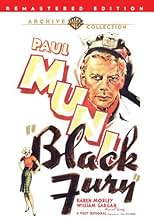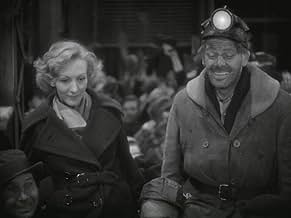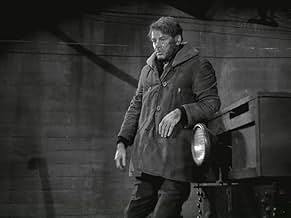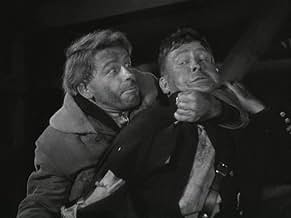AVALIAÇÃO DA IMDb
6,5/10
1,1 mil
SUA AVALIAÇÃO
Adicionar um enredo no seu idiomaAn immigrant coal miner finds himself in the middle of a bitter labor dispute between the workers and the mine owners.An immigrant coal miner finds himself in the middle of a bitter labor dispute between the workers and the mine owners.An immigrant coal miner finds himself in the middle of a bitter labor dispute between the workers and the mine owners.
- Direção
- Roteiristas
- Artistas
- Indicado a 1 Oscar
- 2 vitórias e 2 indicações no total
John Qualen
- Mike
- (as John T. Qualen)
J. Carrol Naish
- Steve
- (as J. Carroll Naish)
Joseph Crehan
- Farrell
- (as Joe Crehan)
Sara Haden
- Sophie Shemanski
- (as Sarah Haden)
G. Pat Collins
- Lefty - Company Policeman
- (as George Pat Collins)
Avaliações em destaque
During the Thirties Warner Brothers had the reputation of being the working class studio and it was films like Black Fury that made for Warner Brothers that reputation. It was rare indeed to see another studio take stories about ordinary working people. Mostly they concentrated on the middle and upper classes because film was a form of escapism during the Depression. Black Fury coming out as it did in the middle of the New Deal was a timely reminder of the difficulties organized labor faced. Not coincidentally 1935 was the year that the Wagner Labor Relations Act was passed, an effort finally by the government to give labor some kind of equal footing with management. The need of the Wagner Act was to correct some of the abuses shown in films like Black Fury.
Paul Muni plays happy go lucky immigrant coal miner Joe Radek. A man admittedly who works hard and no one thinks of as any kind of brain. He gets used good and proper by the company to stir up the miners so they will strike and give the company an excuse to lock out the union and bring in scabs.
What you see with those miners living on subsistent wages in company towns was taken right from current headlines. It may be ancient history to us now, but it was very real for those people back in the day. The Pinkertons as represented by brutal and corrupt company policeman Barton MacLane had an unsavory reputation as strikebreakers and enforcers for management. That too is no exaggeration.
Muni, aided and abetted by former girl friend Karen Morley now seeing the error of some of her ways, sees what a chump he's been and takes some real direct action against the employers. It's spectacular I'll tell you that.
Though his acting style seems to have not worn well with some, not with me mind you, Muni was given a really rare tribute that year. His performance as Joe Radek was the second time a performer had a sustained write-in campaign for him for an acting Oscar. He finished second in the balloting to Victor McLaglen for The Informer and ahead of Mutiny of the Bounty nominees, Clark Gable, Charles Laughton, and Franchot Tone. The following year the Academy banned write-ins and that's been so ever since. Of course the following year Muni won his Oscar for The Story of Louis Pasteur.
We've moved on in America from an industrial to an information based society and films like Black Fury are now part of history. But it's a history we should not forget.
Paul Muni plays happy go lucky immigrant coal miner Joe Radek. A man admittedly who works hard and no one thinks of as any kind of brain. He gets used good and proper by the company to stir up the miners so they will strike and give the company an excuse to lock out the union and bring in scabs.
What you see with those miners living on subsistent wages in company towns was taken right from current headlines. It may be ancient history to us now, but it was very real for those people back in the day. The Pinkertons as represented by brutal and corrupt company policeman Barton MacLane had an unsavory reputation as strikebreakers and enforcers for management. That too is no exaggeration.
Muni, aided and abetted by former girl friend Karen Morley now seeing the error of some of her ways, sees what a chump he's been and takes some real direct action against the employers. It's spectacular I'll tell you that.
Though his acting style seems to have not worn well with some, not with me mind you, Muni was given a really rare tribute that year. His performance as Joe Radek was the second time a performer had a sustained write-in campaign for him for an acting Oscar. He finished second in the balloting to Victor McLaglen for The Informer and ahead of Mutiny of the Bounty nominees, Clark Gable, Charles Laughton, and Franchot Tone. The following year the Academy banned write-ins and that's been so ever since. Of course the following year Muni won his Oscar for The Story of Louis Pasteur.
We've moved on in America from an industrial to an information based society and films like Black Fury are now part of history. But it's a history we should not forget.
Joe Radek (Paul Muni) is a simple-minded, hardworking immigrant coal miner who dreams of buying a farm and settling down with his girl, Anna (Karen Morley). But when Anna leaves him for another man, Joe falls apart and takes to drinking. In Joe's current state of mind, he's manipulated by a union buster (J. Carrol Naish) into revolting against the mining company. This has disastrous results for the laborers but Joe determines to set things right by any means necessary.
Paul Muni's only film with director Michael Curtiz. As was often the case with Muni, his performance can be seen either as brilliant or 100% ham. Whichever it is, I enjoyed it a lot. The cast is full of reliable Warner Bros contract players that are always fun to watch, especially great character actor J. Carrol Naish. It's not surprising this is from WB, the 1930s home of movies about the working class. Certainly interesting from a historical and sociological perspective as a view of labor issues in Depression-era America. It's also fine dramatic entertainment. Based in part on a true story of a 1929 incident at a mine in Imperial Pennsylvania.
Paul Muni's only film with director Michael Curtiz. As was often the case with Muni, his performance can be seen either as brilliant or 100% ham. Whichever it is, I enjoyed it a lot. The cast is full of reliable Warner Bros contract players that are always fun to watch, especially great character actor J. Carrol Naish. It's not surprising this is from WB, the 1930s home of movies about the working class. Certainly interesting from a historical and sociological perspective as a view of labor issues in Depression-era America. It's also fine dramatic entertainment. Based in part on a true story of a 1929 incident at a mine in Imperial Pennsylvania.
Never realized that Paul Muni, (Joe Radek) played in a film concerning miners in Pennsylvania and gave such an outstanding performance beyond anything I realized he had accomplished in his long career on the silver screen. In this film Joe Radek is an immigrant to this country, however, he is very clever in many ways and seeks justice for his fellow workers in the coal mine in which the town people work. Karen Morley,(Anna Novak) gives a great supporting role to this film and really loves Joe Radek and what he is trying to accomplish. The town is controlled by the coal mine owners and Barton MacLane,( McGree )along with William Gargan,(Slim Johnson/Company Police bully the people in the town along with J Carrol Nash,(Steve Croner) who all work against the miners and control their living conditions. There is a big problem trying to establish a Labor Union and there is a constant battle between the very poor and rich people of the community. Paul Muni gave the best performance I have ever seen in this Classic 1935 film, don't miss this picture.
"Black Fury" was the only time Paul Muni worked with Michael Curtiz. Potentially, this film could have been great but it is far from that. Muni wasn't very keen on acting in films, his preference was always going to be the theatre. He wasn't able to tone down his acting style for the cinema for the most part and he often appeared to be playing a caricature. He is guilty of this in the film "Black Fury." He is too theatrical in his facial expressions, his body language etc. Paul Muni plays a simple but honest coal miner who unwittingly becomes involved in a bitter dispute between the workers and the management. Muni, along with other miners, is subjected to intimidation. Barton MacLane is cast as a villain (he usually was) who is sent to destroy the livelihood of all the coal miners in this small community. Technically, the film is a disappointment. It is all too obvious that the sets representing the town in question are all on a soundstage. The sets don't look real and the direction from Michael Curtiz tends to suffer. The story itself is actually quite good and the film maintains a steady pace. The climax is also effective.
The fabulous Paul Muni gives another wonderful performance in this 1935 film.
With a genuine Slavic accent, Muni is superb as a coal miner who loses his girl (Karen Morley) to a company Policeman and goes on a drinking binge as a result. It is at this point that a gangster organization tries to create chaos within the union and Muni becomes their perfect foil.
J. Carrol Naish is excellent as the worker who works for this unholy organization.
Naturally, Muni's best friend is killed in a clash with company police and Muni, now sober, vows revenge.
Morley returns to Muni just in time as he goes down into the mine and starts blowing the place up. It's at this point that the film starts to go down, but with Muni's performance and the problems shown of what the coal miners had to endure plus the dishonesty in trying to break the union, all make for a very good film.
With a genuine Slavic accent, Muni is superb as a coal miner who loses his girl (Karen Morley) to a company Policeman and goes on a drinking binge as a result. It is at this point that a gangster organization tries to create chaos within the union and Muni becomes their perfect foil.
J. Carrol Naish is excellent as the worker who works for this unholy organization.
Naturally, Muni's best friend is killed in a clash with company police and Muni, now sober, vows revenge.
Morley returns to Muni just in time as he goes down into the mine and starts blowing the place up. It's at this point that the film starts to go down, but with Muni's performance and the problems shown of what the coal miners had to endure plus the dishonesty in trying to break the union, all make for a very good film.
Você sabia?
- CuriosidadesThough it received no official Oscar nominations, the Academy permitted write-in candidates this year and when the voting order was announced it turned out that Paul Muni had come in second in the balloting, narrowly behind winner Victor McLaglen but ahead of any of the other nominated actors.
- Erros de gravaçãoAt c. 24 minutes Joe is counting out his money, but he is inconceivably inaccurate. After counting to 68 dollars he places two further bills on the table and counts "73" out loud. A few moments later he counts up to 75 dollars, but, after four more bills have been placed in front of him he announces "76" dollars as his total.
- ConexõesFeatured in Hollywood and the Stars: The Angry Screen (1964)
- Trilhas sonorasWhy Do I Dream Those Dreams?
(1934) (uncredited)
Music by Harry Warren
Played on piano in bar during scene where men challenge Radek
Principais escolhas
Faça login para avaliar e ver a lista de recomendações personalizadas
Detalhes
- Data de lançamento
- País de origem
- Idioma
- Também conhecido como
- Black Fury
- Locações de filme
- Warner Ranch, Calabasas, Califórnia, EUA(mine shaft scenes)
- Empresa de produção
- Consulte mais créditos da empresa na IMDbPro
- Tempo de duração1 hora 34 minutos
- Cor
- Mixagem de som
- Proporção
- 1.37 : 1
Contribua para esta página
Sugerir uma alteração ou adicionar conteúdo ausente

























